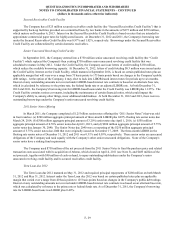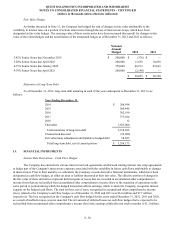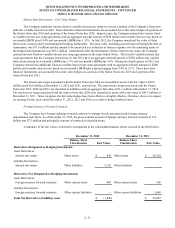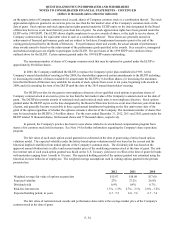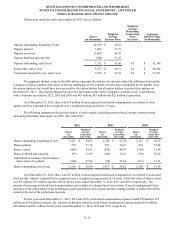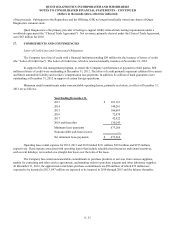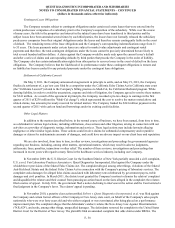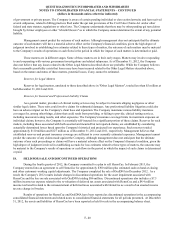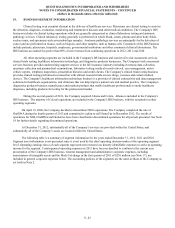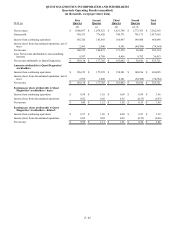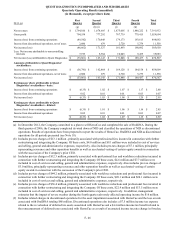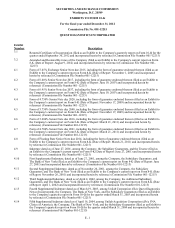Quest Diagnostics 2012 Annual Report Download - page 112
Download and view the complete annual report
Please find page 112 of the 2012 Quest Diagnostics annual report below. You can navigate through the pages in the report by either clicking on the pages listed below, or by using the keyword search tool below to find specific information within the annual report.F- 39
Company filed a motion seeking to limit the application of the NJLAD to only those members of the purported class who
worked in New Jersey and to dismiss the individual defendants. The motion was granted. The only remaining NJLAD claim is
that of the named plaintiff; the ERISA claim remains in the case. Both parties have filed summary judgment motions, which
are pending.
In 2010, a purported class action entitled In re Celera Corp. Securities Litigation was filed in the United States District
Court for the Northern District of California against Celera Corporation and certain of its directors and current and former
officers. An amended complaint filed in October 2010 alleges that from April 2008 through July 22, 2009, the defendants made
false and misleading statements regarding Celera's business and financial results with an intent to defraud investors. The
complaint was further amended in 2011 to add allegations regarding a financial restatement. The complaint seeks unspecified
damages on behalf of an alleged class of purchasers of Celera's stock during the period in which the alleged misrepresentations
were made. The Company's motion to dismiss the complaint was denied. The Company has filed a motion for reconsideration
of the court's denial of the Company's motion to dismiss.
In August 2011, the Company received a subpoena from the U.S. Attorney for the Northern District of Georgia
seeking various business records, including records related to the Company's compliance program, certain marketing materials,
certain product offerings, and test ordering and other policies. The Company is cooperating with the request.
In January 2012, a putative class action entitled Beery v. Quest Diagnostics Incorporated was filed in the United States
District Court for the District of New Jersey against the Company and a subsidiary, on behalf of all female sales representatives
employed by the defendants from February 17, 2010 to the present. The amended complaint alleges that the defendants
discriminate against these female sales representatives on account of their gender, in violation of the federal civil rights and
equal pay acts, and seeks, among other things, injunctive relief and monetary damages. The Company has filed motions to
dismiss the complaint, to strike the class allegations and to compel arbitration with the named plaintiffs.
In September 2009, the Company received a subpoena from the Michigan Attorney General's Office seeking
documents relating to the Company's pricing and billing practices as they relate to Michigan's Medicaid program. The
Company cooperated with the requests. In January 2012, the State of Michigan intervened as a plaintiff in a civil lawsuit,
Michigan ex rel. Hunter Laboratories LLC v. Quest Diagnostics Incorporated, et al., filed in Michigan Superior Court. The
suit, originally filed by a competitor laboratory, alleges that the Company overcharged Michigan's Medicaid program. The
Company's motion to dismiss the complaint was denied.
In March 2011, prior to the Company's acquisition of Celera, several putative class action lawsuits were filed by
shareholders of Celera against the Company, Celera, and the directors of Celera in the Court of Chancery of Delaware and in
California. The suits allege that Celera's directors breached their fiduciary duties in connection with the Company's proposed
acquisition of Celera, and that the Company aided and abetted those alleged breaches. The parties reached a settlement, and the
Court of Chancery of Delaware certified a settlement class and approved the settlement over the objection of a Celera
shareholder, BVF Partners L.P. (“BVF”). Plaintiffs in two substantively similar lawsuits filed in the United States District
Court for the Northern District of California were not party to the settlement agreement but the claims of those plaintiffs were
released pursuant to Court of Chancery's order. On appeal of the Court of Chancery's decision, the Supreme Court of the State
of Delaware affirmed the certification of the settlement class and approval of the settlement, but determined that BVF should
have been afforded the right to “opt out” of the settlement and pursue its claims. The case has been remanded to the Court of
Chancery for further proceedings.
In July 2012, a putative class action entitled Mt. Lookout Chiropractic Center Inc. v. Quest Diagnostics Incorporated,
et al. was filed in the United States District Court for the District of New Jersey against the Company, two of its subsidiaries
and others. The complaint alleges that the defendants violated the federal Telephone Consumer Protection Act by sending fax
advertisements without permission and without the required opt-out notice, and seeks monetary damages and injunctive relief.
The Company has filed an answer to the complaint.
In addition, the Company and certain of its subsidiaries have received subpoenas from state agencies. The Company
and the subsidiaries continue responding to subpoenas from state agencies in two states and cooperating with their requests.
The federal or state governments may bring claims based on new theories as to the Company's practices which
management believes to be in compliance with law. In addition, certain federal and state statutes, including the qui tam
provisions of the federal False Claims Act, allow private individuals to bring lawsuits against healthcare companies on behalf
QUEST DIAGNOSTICS INCORPORATED AND SUBSIDIARIES
NOTES TO CONSOLIDATED FINANCIAL STATEMENTS – CONTINUED
(dollars in thousands unless otherwise indicated)


